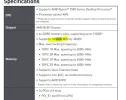Pending OP Response Continuous BSOD
- Thread starter Eugenio95
- Start date
-
Hi there and welcome to PC Help Forum (PCHF), a more effective way to get the Tech Support you need!
We have Experts in all areas of Tech, including Malware Removal, Crash Fixing and BSOD's , Microsoft Windows, Computer DIY and PC Hardware, Networking, Gaming, Tablets and iPads, General and Specific Software Support and so much more.
Why not Click Here To Sign Up and start enjoying great FREE Tech Support.
This site uses cookies. By continuing to use this site, you are agreeing to our use of cookies. Learn More.
You are using an out of date browser. It may not display this or other websites correctly.
You should upgrade or use an alternative browser.
You should upgrade or use an alternative browser.
Welcome to our Community
Wanting to join the rest of our members? Feel free to sign up today.
Sign up

unfortunately i still experience BSODs
You need to upload the latest crash dmps for analysis.
i can't download it since windows defender signals a trojan virus in one of the files inside. It deletes it automatically so fast i cannot allow it to be spared.Please run the lastest version of the PCHF log tool. Post the new PCHF .txt log as well as the dump files.(right click run as administrator)
I ran the disable_tasks script and will set the ram freq to 4800 manually. Attacched you can find the most recent dumps
Attachments
i can't download it since windows defender signals a trojan virus in one of the files inside.
Yeah I just made that tool, I will have to submit it to virus total to Null that issue. I'll Leave you with @phillpower2 👍
Your issues are not driver related per se but are instead down to Windows or the drive that Windows lives on not working properly.
Nope.
To do things properly will take a bit of work to which we will help you with but for now I would just do the below;
Update the BIOS to the latest version.
Download and save to a USB thumbdrive the Windows 11 chipset and AMD/MSI video drivers for your MB, you can download the required BIOS and drivers from here **
Do an inplace upgrade to Windows 11. How to run In-place upgrade in Windows 11
Install the Windows 11 chipset and AMD/MSI video drivers.
Restart the PC and test by using the computer as you normally would before posting back with an update for us.
** Always double check to confirm for yourself that any downloads 100% match the hardware that any BIOS or drivers are intended to be used with.
To do things properly will take a bit of work to which we will help you with but for now I would just do the below;
Update the BIOS to the latest version.
Download and save to a USB thumbdrive the Windows 11 chipset and AMD/MSI video drivers for your MB, you can download the required BIOS and drivers from here **
Do an inplace upgrade to Windows 11. How to run In-place upgrade in Windows 11
Install the Windows 11 chipset and AMD/MSI video drivers.
Restart the PC and test by using the computer as you normally would before posting back with an update for us.
** Always double check to confirm for yourself that any downloads 100% match the hardware that any BIOS or drivers are intended to be used with.
I just wanted to add, that you have:
Which is known to cause a lot of BSOD on windows 10. Might be worth removing it. I would follow the advice of @phillpower2 first, this is just a possibility. Although not directly mentioned in your dump files, it's just that many many people report having BSOD when it is installed and running on their machines.
C:\Program Files\Npcap\npcap.sys
C:\Windows\System32\drivers\npcap.sys
Which is known to cause a lot of BSOD on windows 10. Might be worth removing it. I would follow the advice of @phillpower2 first, this is just a possibility. Although not directly mentioned in your dump files, it's just that many many people report having BSOD when it is installed and running on their machines.


